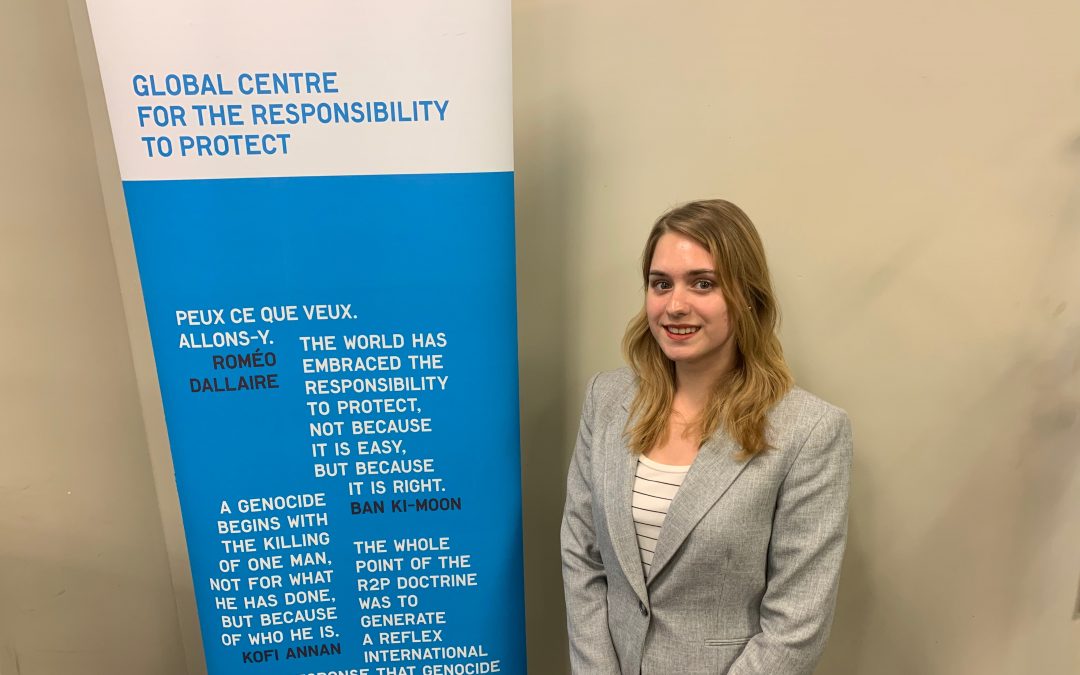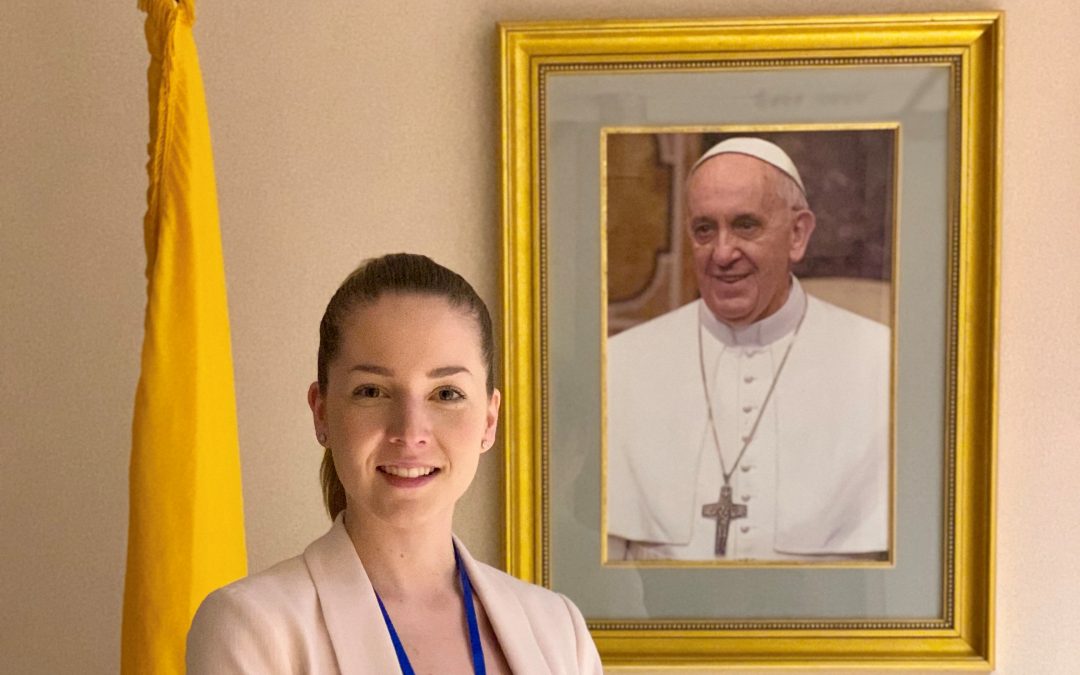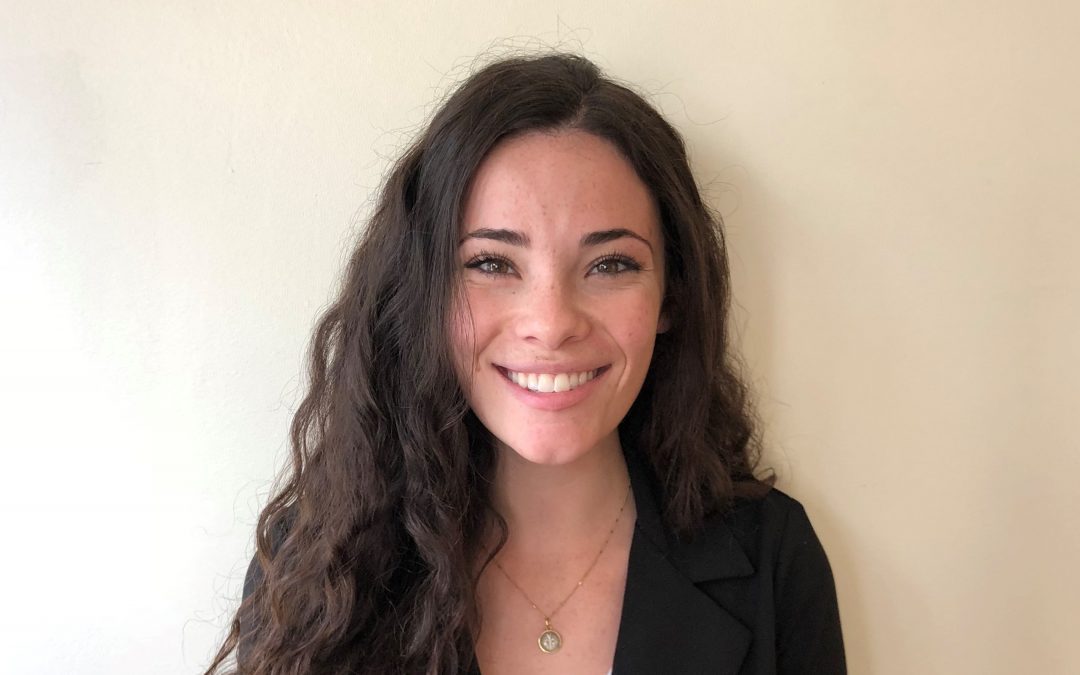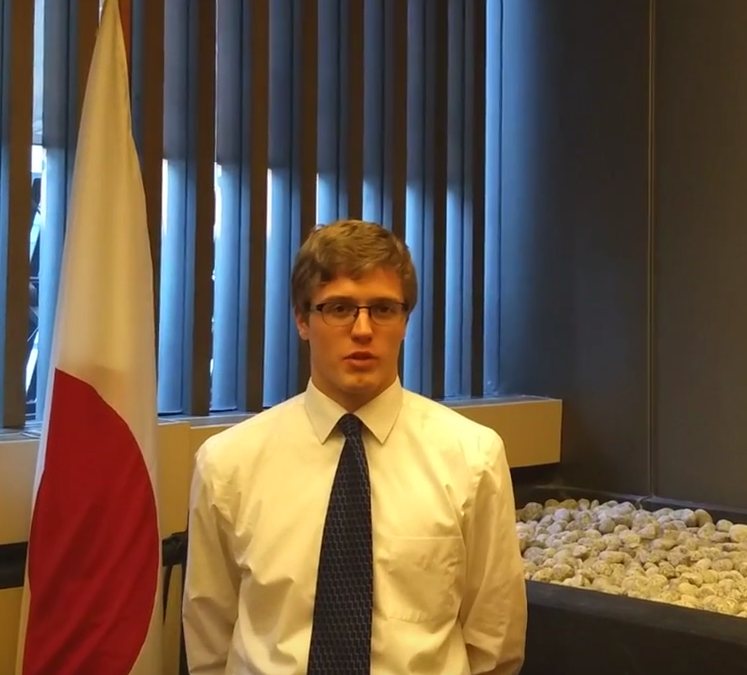
by Madison McHugh | Dec 10, 2019 | Internship Experiences, Undergraduate Students
My name is Stephanie Miller. I am a senior undergraduate student in the Diplomacy and International Relations program with a secondary major in Religious Studies and a minor in Arabic. I completed a research internship at the Global Centre for the Responsibility to Protect in Manhattan, New York.
The Global Centre is a research and advocacy organization that specializes in war crimes, genocide, ethnic crimes, and crimes against humanity. It works with governments, regional bodies, and other NGOs to operationalize the principles of the Responsibility to Protect doctrine into policy frameworks. It also monitors over 20 country situations either at risk or currently committing mass atrocities. As independent institutions, non-profits like the Global Centre are instrumental in ensuring accountability and encouraging inter-governmental action to prevent mass atrocity, and I had a wonderful time working with them.
My decision to pursue this internship was based in curiosity. Mass atrocities are crimes that make international headlines every day, but the corresponding prevention agenda is not something that people usually recognize, even in the classroom. The Global Centre works to bridge the gap between policy and responsible action, calling for the international community to commit to the principles outlined by the Geneva Convention and honor their agreements to protect civilians across the globe. I learned that while this work is not glamorous, it is entirely necessary.
Interning at the Global Centre taught me the difference between humanitarian work and human rights advocacy, cultivating a newfound interest in both. Prior to this internship, I thought that the two terms were mutually interchangeable, and I found that this a common misconception often overlooked. This experience taught me new and transferable skills that are applicable to both fields, honing practical expertise in report writing and analysis, oral communication, conflict mediation, and public engagement. I don’t think I could have found a more supportive and encouraging environment as I developed these new skills, and I look forward to carrying them into my career.
One of the challenges I faced in the beginning of my internship was separating myself from my work. The subject material I was dealing in daily was sometimes difficult to process, and in order to succeed in the position, I had to learn how to leave work in the office rather than take it home with me. I began setting healthy boundaries for myself before I could devote my time and energy to a mission that I quickly grew to care about. This internship taught me more than just practical skills – it taught me a life lesson that many don’t learn until much later, and for this I will always be grateful.
My advice to students looking for internships is to not limit yourself to searching only in the field you are interested in. Diversifying your interests enables you to take advantage of opportunities that you may not have had otherwise. My career goals were vastly different going into this internship than they are now. Working at the Global Centre made me re-evaluate my priorities and consider what I really want to do with my degree after I graduate, which is something I do not think I would have been forced to reckon with if I had worked anywhere else. Internships do not always change your outlook on life, but mine did. I gained new skills, new interests, and a new perspective on the field I want to go into.

by Madison McHugh | May 29, 2019 | Graduate Students, Internship Experiences
My name is Roxane Heidrich. I am a second-year graduate student in the Diplomacy and International Relations Program, specializing in Global Negotiations and Conflict Management and International Security. I completed an internship at the Permanent Observer Mission of the Holy See to the United Nations in New York.
My goal upon graduation is to work in the field of mediation of international conflicts and facilitate dialogue between stakeholders. These conflicts also possess a security dimension prior to peace talks, and I was interested in learning what arrangements need to be present on the ground before one can begin the mediation process. The Holy See matched these interests of mine in their dedication to peace and reconciliation as a religious organization. Such organizations are often at the forefront of mediation efforts, brokering ceasefires and peace agreements and playing a major role in bringing together rival parties and negotiating a successful and lasting peace.
In this sense, my decision to pursue this internship followed my understanding of mediation as an activity that needs to be carried out with the principles of neutrality, genuine engagement, and the unbiased interest of the mediator to help the parties find the best possible solution. I learned that the Catholic Church brings this to the table and more, which is linked to people’s connection through faith and a number of principles that call for mutual understanding and using non-violent means for solving violent crisis.
In my position, I learned much about the principles that guide the work of the Holy See in peacebuilding across the world. More specifically, through attending meetings at the Security Council (where the Holy See is an Observer State), I learned about such security arrangements that are fundamental to the cessation of the hostilities – a step that comes before the deployment of other types of efforts such as mediation and post-conflict reconstruction. I learned even more about UN strategies for peacekeeping and peacebuilding, including the challenges to such efforts which are very often represented by the political disagreement between Member States.
From this internship, I learned many new and transferable skills, such as writing reports in an accurate and timely fashion, speaking about and analyzing current security issues in a critical way, understanding the context of current conflicts such as in Venezuela, Kosovo, Myanmar, and Palestine-Israel, and understanding the timing of UN interventions (peacekeeping, appointment of special envoys, establishment of sanctions, establishment and withdrawal of missions, and mediation/dialogue facilitation) depending on the timing and severity of the conflict and the compliance of the host countries. These new skills represent some of my greatest accomplishments, and I am excited to carry them forward in my career.
Some challenges included coordinating my internship responsibilities with coursework and commuting between South Orange and New York, which could be difficult at times when weather was bad. Overall, however, I would definitely recommend this internship to someone that has a solid grasp of the principles of Catholic Social Teaching and the flexibility to work in a very dynamic environment. The opportunities to learn a lot and to grow professionally are numerous, and I am very grateful for my experience.

by Madison McHugh | Oct 11, 2018 | Internship Experiences, Undergraduate Students
My name is Carlee Sutera, and I am a Senior Diplomacy and International Relations student at Seton Hall University. Over the summer, I interned at the Women’s Entrepreneurship Day Organization (WEDO) in New York City. WEDO is a nonprofit organization whose mission is to educate, empower, celebrate, and support women in business and inspire girls to be leaders in STEAM (Science, Technology, Engineering, Arts, and Math) so they can create a positive impact in their communities worldwide. I was the International Relations Intern responsible for communicating and coordinating with WEDO global ambassadors for the official celebration of Women’s Entrepreneurship Day on November 19th. Since the event is celebrated in 144 countries, there is a lot to be done year-round, and I was given the opportunity to work intimately with ambassadors from the United States, Europe, Africa and the Middle East.
My Diplomacy classes prepared me to interact with people of all different cultures and enhanced my communications and negotiating skills, all of which were essential to my position. The skills gained at my internship have been crucial to my professional development as well, specifically my experience with new communications tools such as WordPress, Canva, and SendGrid. I also had the opportunity to improve my interpersonal skills and networking abilities. When working with many different people on many different, coordinated tasks, there are bound to be communication issues, but I learned to navigate the process and be productive even in high-stress situations.
Some of my favorite assignments included event planning for WEDO-sponsored events, such as our monthly breakfasts with women entrepreneurs discussing their experiences. This was some of the most rewarding work because I was able to see and experience the physical results. Early on, we featured Adi Eckhouse, the creator of the iPhone’s facial recognition technology (called RealFace), from Israel. At another breakfast, we featured Reshma Saujani and Fereshteh Forough, two women pioneers in the coding field with non-profit organizations that encourage closing the gender gap in technology spaces. Listening to women talk about their experiences as entrepreneurs was truly inspiring and further emphasized the importance of what WEDO as an organization is doing. While I have been extremely lucky and privileged with many opportunities in my life, many women around the world do not have the same access. WEDO gives women opportunities that they would not have otherwise, making a real impact on individual lives. Because of this experience, I hope to use my skills to further uplift and support women in my line of professional work. I would recommend this internship to anyone interested in gaining experience with a large and impactful non-profit that also has a significant impact on the lives of women all over the world.

by Madison McHugh | May 3, 2018 | Internship Experiences, Undergraduate Students
My name is Trevor West, and I am a junior at Seton Hall University majoring in International Relations & Diplomacy, Modern Languages (Japanese/Chinese), and Philosophy. I am currently interning at the Japan Society Language Center in New York City, a non-profit organization founded after World War II.
I have a long-standing interest in the Japanese language and culture, reaching back to my childhood and early exposure to Japanese pop culture through anime, video games, and music. I pursued these interests further and began studying the language in hopes of being able to understand and experience more aspects of the culture. The Japan Society is a great organization that helps individuals to learn Japanese as well as appreciate the vast richness of both ancient and contemporary Japanese history, art, and more.
The essential tasks I complete at the Language Center include a variety of administrative work, such as: communicating with clients, registering students for classes, and managing the student information database by adding and updating information. I also interact with staff and see the living process of a school-system. My internship relates to my international relations curriculum as I am experiencing how a non-profit operates and meets its goals.
This internship has been a first-hand look into a system that, until now, my classes have only focused on in the abstract aspects. The mission statement of the Japan Society, with its goal to deepen “mutual understanding between the United States and Japan in a global context” appears abstract until put into practice. The Language Center’s practice fulfills this deepening of mutual understanding by facilitating classroom experiences, and my responsibility is to ensure that interested individuals receive excellent service. These individuals will learn from the courses and further their understanding of the Japanese language and culture, and the Japan Society will be one step closer to their goal of expanding U.S.-Japan relations.
My internship with Japan Society has been a humbling experience and shown me how amazing NGOs are in practice. It is one thing to learn about organizations, institutions, governments, or any other complex topic in the classroom, but actually working and getting to know the feeling of how an organization functions is different. The internship has given me practical knowledge that the classroom has not precisely because physical experience helps one to grasp the abstract concepts learned in the day-to-day functioning of an organization.
This internship is exciting because it is an opportunity to see the real-life application of what I have learned so far in my classes. While the skills I use daily are relatively basic, interning at the Language Center has given me a way to connect with others who are influential in promoting deeper U.S.-Japan relations and allowed me to give back and participate in the mission. Thus, the best part of this internship is the happy union between what I have learned in class and the tangible functioning of Japan Society as well as the opportunity to further U.S.-Japan relations.




